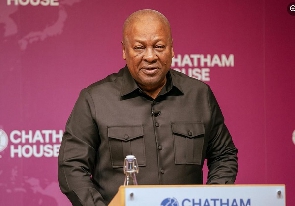President Nana Akufo-Addo’s government has destroyed the bustling Ghanaian economy he inherited from the last administration, former President John Mahama has said in a lecture on ‘Africa’s strategic priorities and global role’ at Chatham House, London.
“In a little under six weeks from today, Ghana will mark sixty-six (66) years of nationhood. Far from being an occasion to celebrate independence and the successes and achievements of nationhood, we will mark this day under the yoke of the worst economic situation in decades”, he said.
Mr Mahama said: “Our present economic situation, underscored by our bankrupt status, sharply contrasts with our fortunes a little over a decade ago. At the time, our economy posted some of the highest growth rates in the world with a robust and fast-growing non-oil sector”.
“Today, many of our economic indicators are pointing south. We have in the last month entered the hyperinflation era with an inflation rate of 54%. Our currency has in the past few months been counted among the worst-performing in the world, plummeting by as much as 54% in value within the first ten months of 2022. Widening budget deficits have characterized economic performance since 2018”.
“A severe cost of living crisis fueled by ever-rising prices of basic goods has imposed extreme hardship on Ghanaians as the government struggles to meet some of its most basic commitments in areas like education and health. Unemployment stood at a staggering 13%, the highest in recent memory”.
“It would be no hyperbole to assert that our present state bears an uncanny resemblance to the late seventies and eighties”.
“How was a country with such bright prospects, only a decade ago, brought to its knees so quickly when it should have made far more progress? The present trouble with our economy stems from gross mismanagement and in some instances sheer recklessness”.
In his view, the “government failed to sustain the gains made after our last IMF programme, which brought stability to the management of the Ghanaian economy. Corruption has also contributed significantly to bring us to this distressing juncture”.
The government, he said, “has been quick to pass off the COVID pandemic as a reason for this poor economic record. Yet, available data shows that many of our neighbours in West Africa and further afield, posted much better economic performances than we did during and after the pandemic”.
The World Bank, he noted, “through its Ghana Country Director, has also stated unequivocally that Ghana’s economy was in distress before the pandemic occurred”.
“The purpose of recounting these failures, driven my mismanagement and corruption, in Ghana is to demonstrate how Africa depletes scarce resources generated from both the continent and development partners. Instead of thinking innovatively to address the fundamental economic problem, many leaders worsen it”, Mr Mahama explained.
Using the management of the COVID-19 pandemic as a case study, he said: “My own country, Ghana, once a beacon of Africa has come up for mention for dissipating domestic and donor funds”.
“A recently published audit report by the Auditor General of Ghana into receipts and expenditures on COVID-19 exposes staggering instances of corruption running into billions of Ghana cedis”, he noted.
“Over GH¢21.8 billion was mobilised to mitigate the impact of the pandemic from the World Bank, IMF, the European Union (EU), the African Development Bank (AfDB), Ghana’s Contingency Fund, and from the sale of Bank of Ghana COVID-19 Bonds”, Mr Mahama added.
According to him, “hiding under the ‘emergency situation’, the government jettisoned our financial and procurement laws and refused to use the GIFMIS system, which is the agreed budget and accounting digital platform to avoid thorough scrutiny. Such financial malpractices discourage delivery of grants and concessionary loans to Africa”.
“I have indicated that we need a forensic audit into the receipts and expenditure of the COVID[1]19 funds in Ghana. The forensic audit may be extended to other countries in Africa to restore investor confidence as we build the Africa we want”.
Business News of Sunday, 29 January 2023
Source: classfmonline.com

















